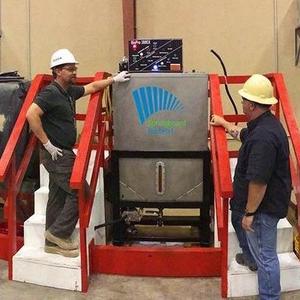Bagram Air Field converts UCO to biodiesel to power incinerators

Photo: DVIDS
September 24, 2015
BY Summer Barkley, DVIDS
Three unrelated problems were solved by one simple solution devised by Logistics Civil Augmentation Program IV contract partner Fluor to convert used cooking oil into biodiesel to help power solid waste incinerators at Bagram Air Field in Afghanistan.
The problems of environmentally responsible disposal of used cooking oil, powering solid waste incinerators and providing stewardship of taxpayer dollars were addressed when the contactor proposed a biodiesel process to Defense Contract Management Agency in March 2015 and processed the first 100-gallon batch May 3.
“Bagram generates an average of 186 gallons of used cooking oil each day,” said Christopher Waechter, Fluor country environmental manager. “We chose a turnkey biodiesel processing system [The BioPro 380EX and SpringPro T76 from Springboard Biodiesel] for ease of use … by local national laborers.”
Waechter said the initiative was proposed as a cost avoidance measure with a three-week return on investment. The overall cost avoidance is projected to be as much as $750,000 per year.
Since Fluor provides Hazardous waste processing for Forward Operating Bases Dahlke and Fenty, they are able to ship used cooking oil from those locations, he said.
In addition to the cost savings, the process has the added benefits of removing used cooking oil from the waste stream and increasing the skill sets of the local national workers while allowing them to work in a safer work area.
Using biodiesel to fuel the incinerators is also a much safer option than traditional methods according to Waechter.
“Biodiesel is both biodegradable and nonflammable,” Fluor Health, Safety and Environmental Director Peter Provost said. “JP8 has a flashpoint of 98 degrees Fahrenheit whereas the biodiesel has a flashpoint of 300 F so we’ve improved our safety envelope by more than three times. Any time you can achieve that kind of a percentage improvement, [it’s] a good thing.”
“As the North Afghanistan Performance Contractor, Fluor is an important member of Team LOGCAP. This program is only one of many examples where they soar above the level of expectation. LOGCAP is meant to be a Force Multiplier for the warfighter, but the cooking oil to biodiesel program also benefits the country of Afghanistan and the American taxpayer.”
By turning thousands of gallons of waste into environmentally conscious fuel, the LOGCAP team is also significantly reducing the project’s environmental impact.
“Prior to this approach, we’d been paying a contractor to come and haul the used cooking oil to an off-site wastewater treatment plant for disposal,” Waechter said. “Now instead of adding all of that additional waste to an already overtaxed system, we’re able to process it right here on base and turn it into something reusable. Environmentally speaking, we’re light years ahead of where we were.”
Waechter said the used cooking oil to biodiesel program has turned 25,866 gallons of used cooking oil into 26,659 gallons of biodiesel with a cost savings of $207,397.04. Waechter said the addition of methanol and a small amount of potassium hydroxide accounts for the output exceeding the amount of cooking oil processed.
This initiative is paired with an existing program that reclaims used motor oil and other fuel for use in the incinerators. That program is in its sixth year and has realized total savings of $7.1 million while diverting 7,740 barrels of used fuel from the waste stream.
Advertisement
Advertisement
Related Stories
The USDA significantly increased its estimate for 2025-’26 soybean oil use in biofuel production in its latest World Agricultural Supply and Demand Estimates report, released July 11. The outlook for soybean production was revised down.
U.S. fuel ethanol capacity fell slightly in April, while biodiesel and renewable diesel capacity held steady, according to data released by the U.S. EIA on June 30. Feedstock consumption was down when compared to the previous month.
The U.S. EPA on July 8 hosted virtual public hearing to gather input on the agency’s recently released proposed rule to set 2026 and 2027 RFS RVOs. Members of the biofuel industry were among those to offer testimony during the event.
The USDA’s Risk Management Agency is implementing multiple changes to the Camelina pilot insurance program for the 2026 and succeeding crop years. The changes will expand coverage options and provide greater flexibility for producers.
The USDA’s National Agricultural Statistics Service on June 30 released its annual Acreage report, estimating that 83.4 million acres of soybeans have been planted in the U.S. this year, down 4% when compared to 2024.
Upcoming Events










